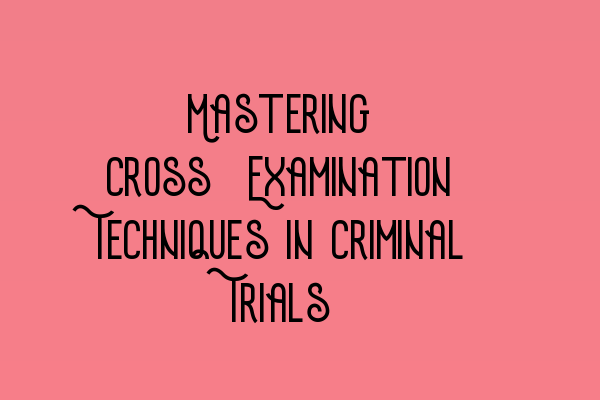Mastering Cross-Examination Techniques in Criminal Trials
In a criminal trial, cross-examination plays a crucial role in determining the outcome of the case. It is during cross-examination that the defense lawyer gets the opportunity to challenge the credibility and reliability of the prosecution’s witnesses. This is a skill that aspiring criminal law practitioners must master in order to successfully defend their clients and secure favorable verdicts.
The Art of Cross-Examination
Effective cross-examination requires careful preparation and a strategic approach. As a criminal law practitioner, you should begin by thoroughly reviewing the witness statements, police reports, and other pieces of evidence available for the case. This will enable you to identify potential inconsistencies, contradictions, or weaknesses in the prosecution’s case.
During cross-examination, focus on highlighting the weaknesses in the witness’s testimony. Through a series of pointed questions, you can expose any discrepancies or biased statements, casting doubt on the witness’s credibility. Pay attention to the witness’s body language and vocal cues, as these can reveal potential weaknesses in their testimony.
Remember, cross-examination is not about merely discrediting the witness; it is about presenting an alternative narrative that favors your client’s innocence. By using persuasive techniques such as leading questions and impeachment, you can effectively challenge the witness’s version of events and present compelling evidence that supports your client’s defense.
Preparation is Key
Cross-examination is not a process that can be tackled haphazardly. Thorough preparation is essential to ensure that you are well-equipped to counter the prosecution’s case. Familiarize yourself with the relevant legislation and case law, and anticipate the arguments and objections that the prosecution may raise.
To further enhance your cross-examination skills, consider enrolling in SQE 1 Preparation Courses where you can gain practical experience through mock trials and receive guidance from experienced practitioners. These courses can help you develop a solid understanding of the criminal trial process and equip you with the necessary skills to excel in cross-examination.
Effective Questioning Techniques
When cross-examining a witness, it is important to employ effective questioning techniques that elicit the desired responses. Open-ended questions allow the witness to provide detailed explanations and can help uncover additional information that may be beneficial to your client’s case.
However, be cautious of leading questions. While they can be useful in guiding the witness towards the answers you seek, leading questions may be objected to by the prosecution or judge if they are deemed to be suggestive or unfairly leading the witness.
Additionally, consider using impeachment techniques to challenge the witness’s credibility. This can involve presenting prior inconsistent statements, introducing past convictions or misconduct, or highlighting any bias or ulterior motives that the witness may have.
Building Rapport and Controlling the Narrative
Building rapport with the witness can sometimes be advantageous during cross-examination. By establishing a friendly and empathetic tone, you may encourage the witness to provide more favorable or revealing answers. However, be careful not to appear too sympathetic or compromising your position as an advocate for your client.
Controlling the narrative is also crucial in cross-examination. Through systematic questioning, you can guide the witness’s testimony towards the facts and arguments that support your client’s defense. This helps to shape the jury’s perception of the case and reinforces your client’s innocence.
To further enhance your legal knowledge and practical skills, consider exploring additional resources such as SRA SQE Exam Dates to ensure you stay updated with the latest developments in criminal law.
Conclusion
Mastering cross-examination techniques in criminal trials is an essential skill for any aspiring criminal law practitioner. By thoroughly preparing for cross-examination, employing effective questioning techniques, and controlling the narrative, you can successfully challenge the prosecution’s case and secure favorable outcomes for your clients.
For comprehensive preparation resources, including SQE 1 Practice Exam Questions and SQE 1 Practice Mocks FLK1 FLK2, consider enrolling in SQE 2 Preparation Courses to further develop your skills and knowledge in criminal law.
